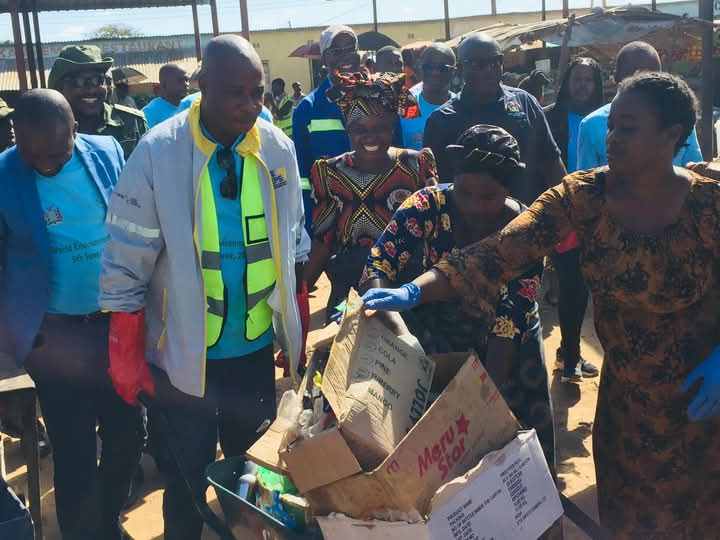By Engineer Gabriel Mukuka- PC-SE/CC
Introduction
Zambia, a nation blessed with abundant natural resources covering 752,612 km², faces a critical challenge: hunger. Recent extreme weather events, exacerbated by phenomena like El-Nino, have devastated agricultural yields across the nation, particularly affecting maize, a vital staple. With an impending rise in hunger, urgent intervention is essential. The implementation of comprehensive food loss and waste policies and strategic plans emerges as a pivotal strategy to mitigate the consequences of food scarcity.
The Rationale
The urgency to address food loss and waste in Zambia stems from a complex interplay of factors that threaten the nation’s food security, economic stability, and social well-being. Climate change-induced events, such as erratic rainfall patterns and extreme weather events like droughts and floods, have severely disrupted agricultural production cycles, leading to unpredictable crop yields and exacerbating food insecurity.
With a rapidly growing population of 19,610,769 people, characterized by a high dependency ratio and substantial demographic pressure, the demand for food resources continues to escalate, placing significant strain on already stretched agricultural systems.
Moreover, the economic implications of food loss and waste are profound, resulting in substantial financial losses for farmers and agribusinesses, as well as exacerbating environmental degradation through increased greenhouse gas emissions and deforestation.
Socially, inadequate access to nutritious food contributes to malnutrition, particularly among vulnerable populations, and undermines human development outcomes, hindering progress in education and economic empowerment. Addressing food loss and waste is therefore not only imperative for safeguarding food security and economic stability but also for promoting social cohesion and human well-being.
By implementing comprehensive strategies that encompass policy reforms, technological innovations, capacity building initiatives, and cross-sectoral collaboration, Zambia can mitigate the adverse impacts of food loss and waste, enhance agricultural resilience, and pave the way for a more sustainable and food-secure future.
What Can be Done?
To effectively tackle food loss and waste, Zambia must adopt a multifaceted approach:
1.Policy and Strategic Plan Development: The government should prioritize the formulation and implementation of tailored food loss and waste policies and strategic plan. These policies and strategies should encompass regulatory measures, incentives, and support mechanisms to promote sustainable practices and minimize waste.
2.Technology Integration: Embracing innovative technologies, such as cold storage facilities and digital solutions like blockchain, can significantly reduce food losses. Efficient irrigation systems and post-harvest management techniques should also be employed to mitigate losses due to spoilage and inefficiencies.
3.Capacity Building: Investment in farmer education and training programs is crucial. Equipping agricultural stakeholders with proper harvesting, storage, and transportation techniques, alongside raising awareness about the importance of reducing food waste, is paramount.
4.Partnerships and Collaboration: Collaboration among government agencies, NGOs, private sector entities, and international organizations is essential. Leveraging diverse expertise and resources will enable the development of comprehensive strategies to address the root causes of food loss and waste.
Expected Results
Implementation of food loss and waste policies in Zambia is anticipated to yield significant benefits:
1.Reduced Hunger: With a population of 19,610,769, comprising 60% rural and 40% urban residents, minimizing losses in the food supply chain will ensure a more abundant and reliable food supply, thereby alleviating hunger and malnutrition.
2.Improved Food Security: Enhancing the efficiency of food production and distribution systems will enhance resilience to future shocks and crises.
3.Environmental Sustainability: Mitigating food waste will contribute to environmental conservation by reducing deforestation rates and greenhouse gas emissions associated with agriculture. Notably, deforestation rates rose to 172,000 ha per annum in 2021 from 120,000 ha in 1994, while emissions of greenhouse gases (GHGs) increased by 47% to 126,758 GgCO2eq in 2016 from 86,063 GgCO2eq in 1994.
4.Economic Growth: Streamlining the food supply chain and reducing losses will unlock economic opportunities for farmers and entrepreneurs, fostering growth and prosperity in rural areas. Currently, Zambia has approximately 3,714,667 head of cattle, 3,583,696 goats, and 170,262 sheep, indicating the potential for economic development through efficient agricultural practices.
Conclusion
In response to escalating hunger and agricultural challenges, Zambia must prioritize the development and implementation of food loss and waste policies. A comprehensive approach integrating policy, strategic plans, technology, capacity building, and collaboration is imperative to ensuring a hunger-free future for all Zambians while safeguarding natural resources and fostering economic development. The time for decisive action is now, and by leveraging data-driven strategies and innovative solutions, Zambia can overcome the barriers to food security and pave the way for a sustainable future.



